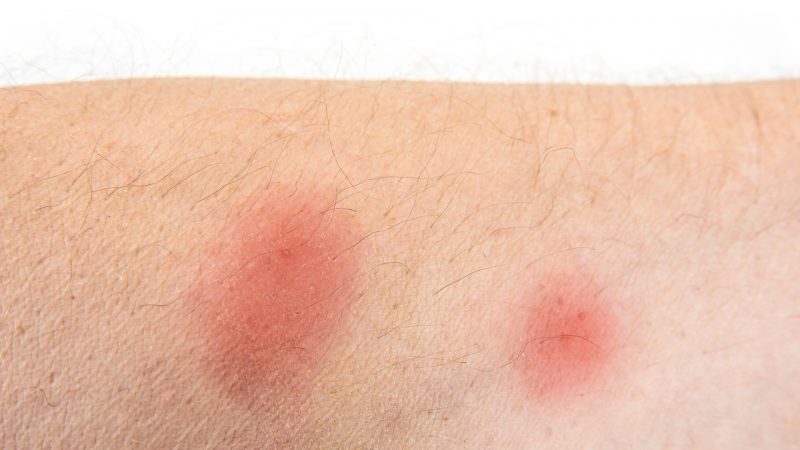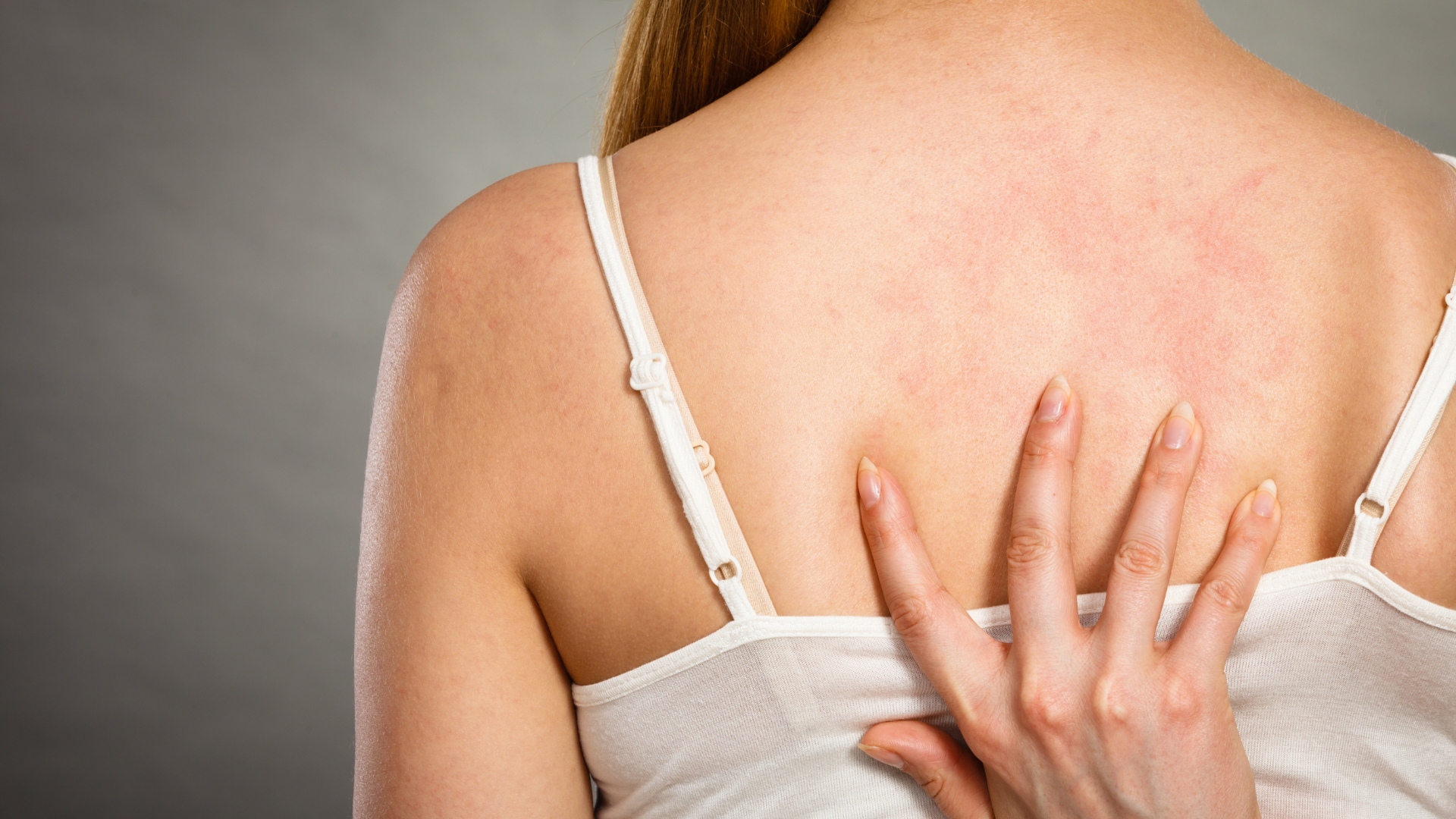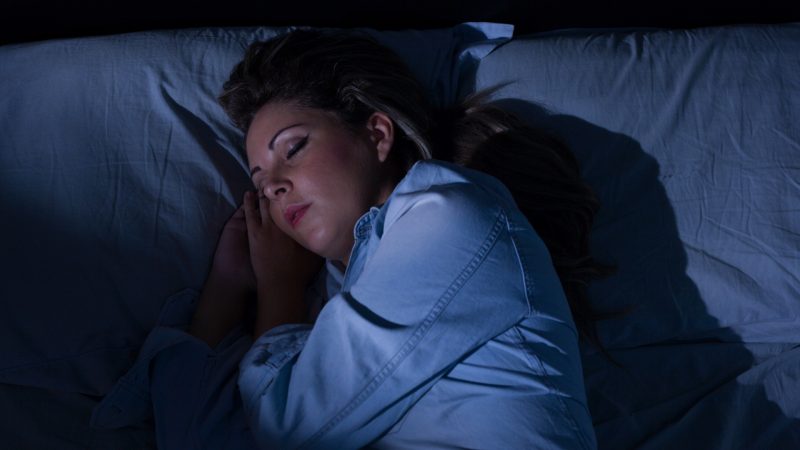Most people who have not had the misfortune of dealing with bed bugs before, usually realize that they are dealing with their own bed bug infestation when it’s too late. This happens because these pests are sneaky. These sneaky traits start with their skilled blood-sucking abilities.
Are bed bug bites itchy? Bed bug bites can be itchy for some people. They’re using their straw-like mouthpieces to pierce through the skin of a warm-blooded living being and then proceed to suck out their blood. They inject the skin with an anesthetic, which temporarily numbs the area that was just pierced.
Stick around and gather more information about your unwanted visitors. This will in effect help you in your fight against the possible bed bug infestation in your home.
What Do Bed Bug Bites Look Like?

These are the signs that you have been bitten by a bed bug:
- Red and swollen
- These bites appear in a cluster or a line
- They are itchy
- May develop into blisters after continues scratching
There isn’t much about the bed bug bites appearance that distinguishes them from other bug bites other than the fact that they tend to appear in a cluster or line. This could be a result of the fact that bed bugs cannot fly and thus prefer to feed in the same area until they are full.
Difference Between Bed Bug Bites and Other Types of Bites
Now, in order to really tell them apart from other insect bites, let us look at the distinguishing characteristics of the other common insect bites.
- Flea bites – have a red spot right in the middle of the bite/ swollen area. The bites are mainly found around your ankles and the moist areas around your joints, e.g. armpits, etc.
- Mosquito bites – look very much like bed bug bites but the only difference is that they do not appear in a cluster, instead they appear randomly on any part of the exposed skin. This could be due to the fact that mosquitoes do fly and can pick random places on your exposed skin to have a meal.
- Hives – hives may be a result of having an allergic reaction to something. The way to distinguish between a hive and a bed bug bite is that hives often change location and color, unlike bed bug bites that remain in the same area.
Where Do Bed Bugs Bite Humans?

Bed bugs live on an exclusive meal plan which happens to be running through your veins as you read this article. The only thing that stands between bed bugs and their five-star meal is the skin on your body. Skin, that also happens to be hairless.
Why is hair important? This is because bed bugs are not built to traverse through fur or hair which happens to cover your head and your private parts. The hair on those areas is the biggest constraint to bed bugs when they are sourcing for a meal, however, they will still hitch a ride in it if push came to shove.
Having eliminated your limited hairy areas leaves us with the largest organ on your body – the skin. Bed bugs will feed on any part of your exposed skin, that’s right, all the way from your hairline down to your feet. If you feel itchy in any of these areas, check out the bed bug bite characteristics listed above to try and identify the bite.
The sad news is that knowing what a bed bug bite looks like may not be enough and if you wake up to itchy welts in the morning, do a thorough check of your bed and see if you indeed do have bed bugs.
When Do Bed Bugs Bite?

Bed bugs are nocturnal pests meaning that they are mostly active at night. They will locate your place of sleep through the carbon dioxide being expelled by you and with the warmth of your body.
It should be noted that since they are active mostly during the night, it doesn’t mean that they cannot feed during the day, they can and they will especially if they are very hungry.
When Do You Feel Bed Bug Bites?
The itchiness starts after the anesthetic starts wearing off and the bed bug is after that long gone having filled up on your blood. This reaction (itchiness) is only felt by some people, while others will remain unaffected, without even knowing they have been bitten by the bed bugs.
As if that trick wasn’t enough, their saliva also comes laced with an anticoagulant that prevents the blood from clotting as the bug feeds.
The anesthetic effect isn’t the only trick up their tiny sleeves no, it is just a drop in the bucket when it comes to these pests. There is a lot to uncover when bed bugs are in question, however, this article focuses on the characteristics of bed bug bites, their appearance as opposed to other insect bites, where to expect bed bug bites on your body, how to treat these itchy bites, etc.
Do Bed Bugs Bite Pets?

Bed bugs do bite pets. As noted above, bed bugs have a hard time navigating through hair or fur, however, they can still latch on and hitch a ride. When it comes to feeding your pet, it happens mostly in the event that you are dealing with a bug infestation. They will mostly feed on your pet’s underbellies and around the ears where they can easily access the skin.
Your pet when he gets bitten will, in turn, start scratching continually and if the bed bug situation isn’t remedied, the itching may cause the skin to break and cause an infection if not attended to soon. To remedy this, check for signs of bed bug bites on their underbelly and their ears and since chances of finding the bed bugs on the pet are low, check the pet living area.
Remember bed bugs do not live on their host, instead, they feed and then retreat to their hiding spots, usually around the sleeping quarters.
After you have identified that your pets are in an infested situation, take up treatment measures immediately. Start by cleaning all the pet’s items, and then groom your pet by trimming the fur (most severe cases), after this give your pet a bath using organic shampoo.
No products found.
This kind of shampoo will soothe the irritated skin. If the scratches are severe, it would do you well to visit a vet and then later deal with the bed bug situation around your home to avoid a repeat of the same situation.
How Long Does the Itchiness from the Bed Bugs Last?
Usually, the average time that the itchiness will last is around an hour or so. However, this will certainly depend on the person because as we have seen in the prior point, some people do not even notice that they are getting bitten by bed bugs. This is the same with the itchiness. Some people will have a severe reaction to it while others will scratch it only a few times and then forget they were ever bitten.
Home Remedies for Stopping the Bed Bug Itchiness
Some people don’t have a severe reaction to the bed bug bites which tend to go down by themselves without much fuss, much like a mosquito bite. For these people, we recommend leaving it to heal on its own. This takes around an hour or so. Other people have it tougher so taking the following home remedies can ease the itchiness:
- Cool the itchy area with a cold cloth or an ice pack.
- Apply a thin layer of baking soda and water paste to soothe the area.
- Apply essential oils or something like chamomile lotion to soothe the itchy surface.
- Apply anti-itch cream but in the case that the itching is a little more unbearable, take an antihistamine or an over-the-counter pain reliever to counter the swelling and pain.
No products found.
If the bites break out into hives, and contain pus or blisters, it is time to seek medical attention. Home remedies are recommended in situations that aren’t severe so be careful when administering them.
List of Sources
Bedbugs. Mayo Clinic.
Sutherland, A. M., Choe, D. -H., Lewis, V. R. (2013). Bed Bugs. Agriculture and Natural Resources, University of California.
Potter, M. Bed Bugs, Extension Entomologist, University of Kentucky College of Agriculture.
- How to Get Rid of Copperheads | Practical Guide - August 27, 2023
- How to Get Rid of Corn Snakes | What Makes Them Aggressive? - August 27, 2023
- How to Get Rid of Alligators | Safety Measures and Removal Methods - July 16, 2023
